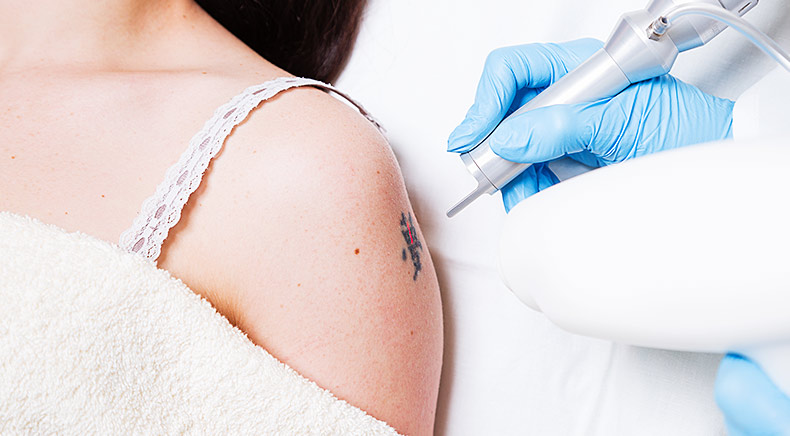laser tattoo removal in Abu Dhabi is generally safe for a wide range of skin types, but there are a few considerations to keep in mind depending on individual skin characteristics. Advances in laser technology have made it possible to treat various skin tones effectively, but the type of laser used and the professional’s experience are key factors in achieving safe and effective results.
Contents
1. Fair to Medium Skin Types2. Darker Skin Types3. Factors That Impact Safety Across Skin Types4. Choosing an Experienced ProfessionalFAQS1. Is laser tattoo removal painful?2. How many sessions will I need for laser tattoo removal?3. Can laser tattoo removal completely remove a tattoo?4. Are there any side effects of laser tattoo removal?5. Is laser tattoo removal safe for all skin types?
Here’s a breakdown of how laser tattoo removal works with different skin types:
1. Fair to Medium Skin Types
- Laser Choice: Fairer skin types are usually treated with the Q-switched Nd
laser, which has wavelengths that target tattoo ink without heavily affecting surrounding skin.
- Efficacy: Laser tattoo removal is often highly effective on lighter skin tones because there’s less melanin (pigment) that could absorb the laser energy. This typically allows for more straightforward removal.

2. Darker Skin Types
- Laser Choice: Darker skin types (Fitzpatrick Skin Types IV-VI) often require special consideration to prevent unwanted changes in skin pigmentation, such as hyperpigmentation (dark spots) or hypopigmentation (light spots).
- Preferred Lasers: For darker skin, lasers with longer wavelengths, like the Nd
laser at 1064 nm, are often chosen because they penetrate deeper and are less likely to affect melanin in the skin.
- Precautions: Practitioners may use lower energy settings and space out sessions more to allow the skin adequate time to heal and avoid pigment changes.
3. Factors That Impact Safety Across Skin Types
- Tattoo Ink Color: Different ink colors require different laser wavelengths. Darker inks (black and dark blue) are typically easier to remove across all skin types, while lighter colors may require specialized lasers and additional sessions.
- Skin Sensitivity and Healing: People with sensitive skin or certain skin conditions should consult a dermatologist or experienced laser specialist, as they may be more prone to irritation or slower healing.
- Post-Treatment Care: Following proper aftercare is essential to minimize side effects like scarring or pigmentation changes.
4. Choosing an Experienced Professional
- Seeking treatment from a qualified, experienced laser technician or dermatologist is essential, especially for darker skin types. A trained professional can customize the laser settings to minimize risks and achieve optimal results safely.
FAQS
1. Is laser tattoo removal painful?
- The pain level during laser tattoo removal can vary depending on the individual’s pain tolerance and the location of the tattoo. Some describe the sensation as feeling like a rubber band snapping against the skin, while others may experience more discomfort. Topical numbing creams are often applied to minimize discomfort during the procedure.
2. How many sessions will I need for laser tattoo removal?
- The number of sessions required for complete tattoo removal depends on various factors such as the tattoo’s size, color, location, and depth of the ink. On average, most people need between 5 to 10 sessions, spaced about 6 to 8 weeks apart, to achieve optimal results.
3. Can laser tattoo removal completely remove a tattoo?
- While laser tattoo removal can significantly fade or completely remove tattoos, the results vary from person to person. Some tattoos, especially those with stubborn colors like green or light blue, may require more treatments. Certain factors such as skin type, tattoo age, and ink depth also play a role in the effectiveness of the removal process.
4. Are there any side effects of laser tattoo removal?
- Side effects from laser tattoo removal are typically minimal but can include temporary redness, swelling, or scabbing around the treated area. In rare cases, some individuals may experience changes in skin pigmentation (light or dark spots), scarring, or blistering. Following proper aftercare instructions helps reduce the risk of complications.
5. Is laser tattoo removal safe for all skin types?
- Yes, laser tattoo removal is generally safe for a wide range of skin types. However, individuals with darker skin tones should ensure that a skilled professional uses the correct laser settings to minimize the risk of hyperpigmentation or hypopigmentation. The type of laser used, as well as proper aftercare, are essential for safety and effectiveness.


